Measuring the hallmarks of ageing – how can you track the underlying causes of ageing?
What consumer tests are available to check your hallmarks of ageing and how they're impacting your body?
Join the club for FREE to access the whole archive and other member benefits.
One of the few supplements I take, from time to time, are NAD boosters. This is because NAD levels have been shown to decline with age and, given how NAD+ is crucial for many important cellular processes, it seems like a good idea to strive to raise its level again.
I’ve previously tried NMN (both DoNotAge and Jinfiniti) and NR (Tru Niagen capsules) – but this time, I’m trying nicotinamide (mixed with a few other vitamins and botanicals) in the form of Nuchido TIME+.
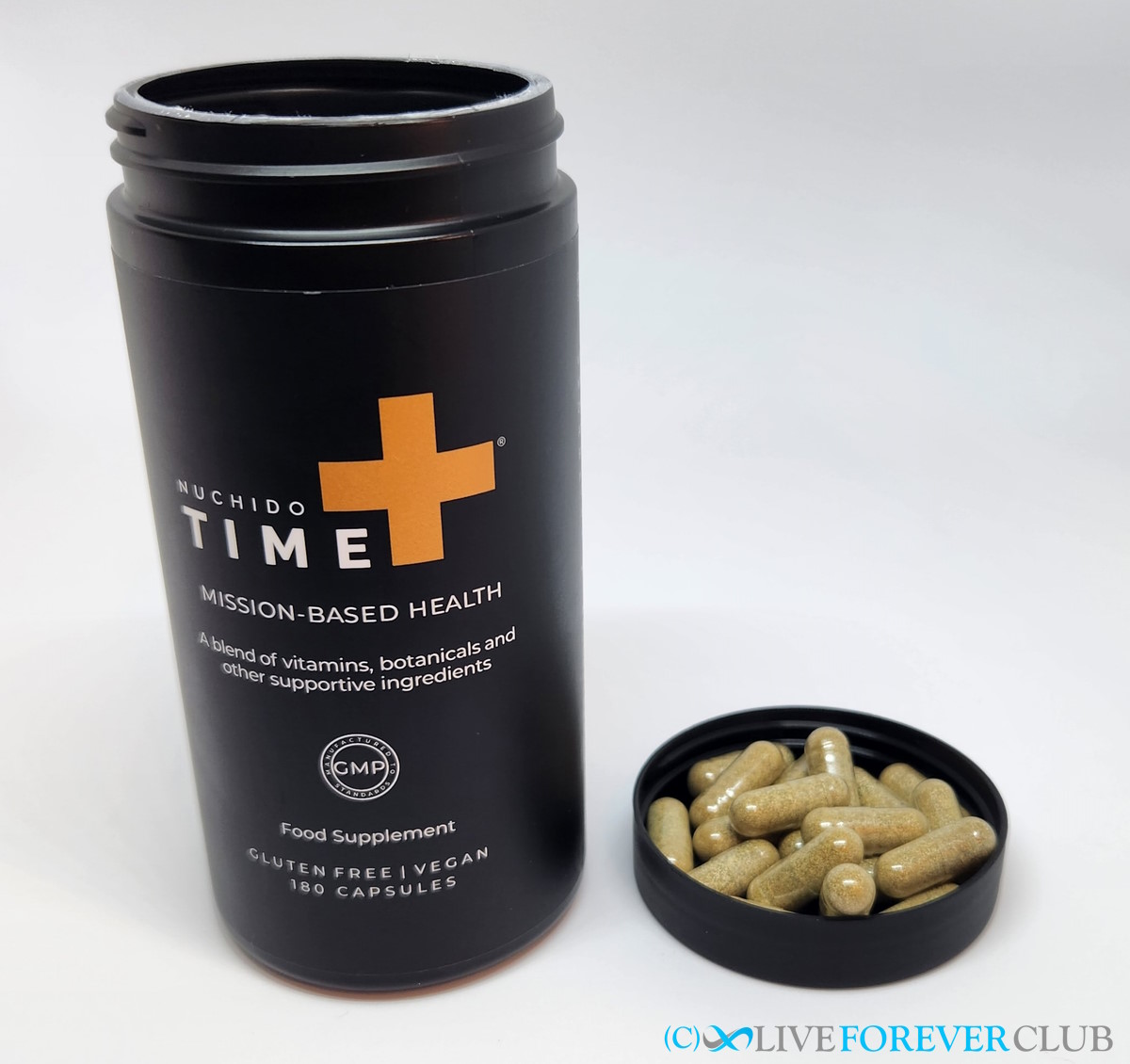
As with the other blogs, the product has been kindly donated by the supplier. Nuchido did not request, and have not been given, any editorial input to this article. The Live Forever Club will always provide independent and unbiased information about life extension.
The primary ingredient of Nuchido TIME+ is nicotinamide – a classic NAD booster. The capsules also contain zinc, alpha lipoic acid, vitamin C and a botanical blend including parsley leaf, green tea leaf extract, rutin and black pepper. The recommended dose is 6 capsules a day providing a total of 500 mg of nicotinamide.
Although labelled as niacin (due to regulations) the supplement is in the form of nicotinamide which does not cause a niacin flush. The nicotinamide and niacin molecules are very similar, being pyridine-3-carboxamide and pyridine-3-carboxylic acid, respectively.
The supportive ingredients provide additional health benefits but also allow Nuchido to protect its patented formulation whilst running clinical trials. According to Nuchido, a randomised, double-blinded, placebo-controlled crossover clinical trial (male and female participants, aged 20-80 years old) reported the following results:
Nicotinamide, also known as niacinamide, is a form of vitamin B3 that plays a crucial role in various cellular processes, such as:
Nicotinamide is considered safe when taken in recommended doses, however, high doses of it can cause side effects such as vomiting, and flushing.
While all involved in the NAD salvage pathway, nicotinamide, nicotinamide mononucleotide (NMN), and nicotinamide riboside (NR) are all subtly different. Metabolically, nicotinamide can be directly converted to NAD+ through the salvage pathway, while NMN and NR require additional enzymatic steps for conversion. And looking at their chemical structure, nicotinamide is a simple amide of nicotinic acid, while NMN and NR are mononucleotides and ribosides of nicotinamide, respectively.
It is still unclear how the different forms of nicotinamide pass through the cell membrane when taken as a supplement, and whether this varies between people, and so it is often best to see which one works best for you personally.
My trial consisted of a 6-week run in period when I monitored the selected biomarkers (mainly physical, but not as often as I should have), 2 months of active ingredient (i.e. taking the Nuchido TIME+ supplements) and a 6-week run out period where I continued to monitor my biomarkers to see if any observed changes reverted once I had stopped supplementing.
Below, I go through the biomarkers in turn, and make a reasonably subjective assessment of whether they were impacted by the nicotinamide-based supplements. Obviously, this is an N-of-1 trial (with a limited number of data points within that) so it is hard to takeaway any definitive conclusions.
The most direct impact of NAD boosters should be, obviously, the level of NAD in the body.
To test this, I took a Jinfiniti intracellular NAD test at the end of the supplementation period. However, due to budget constraints, I didn’t take one before the trial started so some interpretation of the graph below is needed.
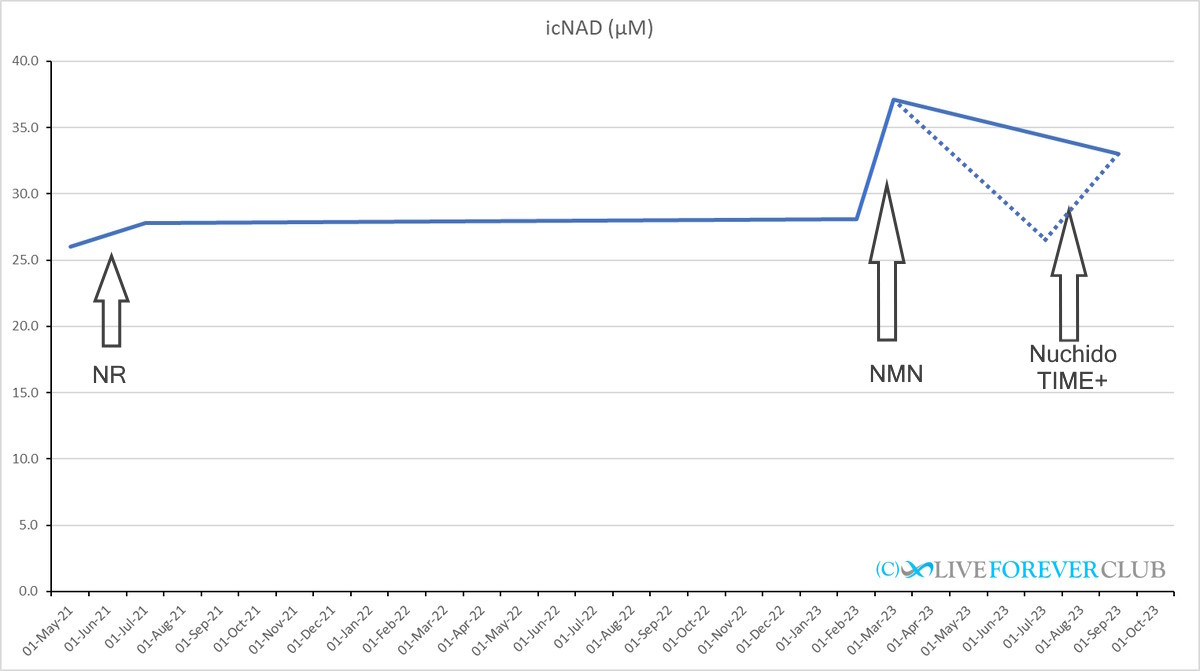
My NAD tests have been few and far between, previously only before and after similar trials. It did not increase significantly when taking NR, but did when taking NMN. I have added in a dotted line to indicate the likely fall in NAD level after stopping NMN supplementation, is it is not reasonable to assume that the higher level was maintained then dropped due to taking nicotinamide.
I have used Jinfiniti several times before for testing my NAD levels, and blogged about it here:
https://liveforever.club/blog/jinfiniti-nad-test-review
In November, 2 months after stopping Nuchido TIME+, I tried another NAD test provided by Biostarks. Its result used different units (ug/gHb) which cannot be directly converted to μM as it depends on the patient’s concentration of hemoglobin and red blood cell volume. However, the result was half of the minimum normal range threshold so suggests it had fallen back down to my normally low level in that time.
Grip strength is a surprisingly good measure of biological age, though I can’t see any effect on it during the trial.
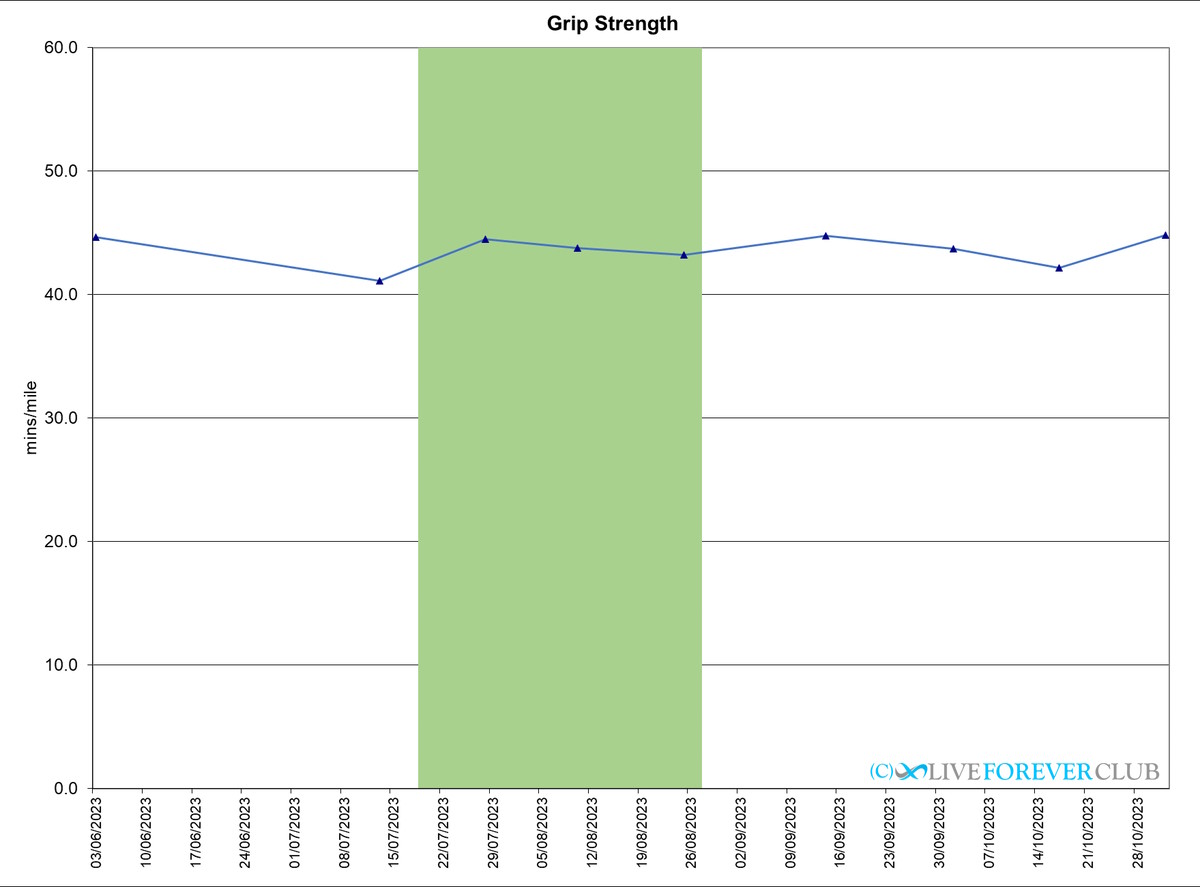
Systolic and diastolic pressure appeared to decrease by a few mmHG within a couple of weeks, and returned to previous levels in a similar period of time after the trial.
It looks like my pulse rate went up about 5 bpm (from low 50s to high 50s) and took longer to come back down. This would have been something to closely monitor if I had continued with the supplements for longer.
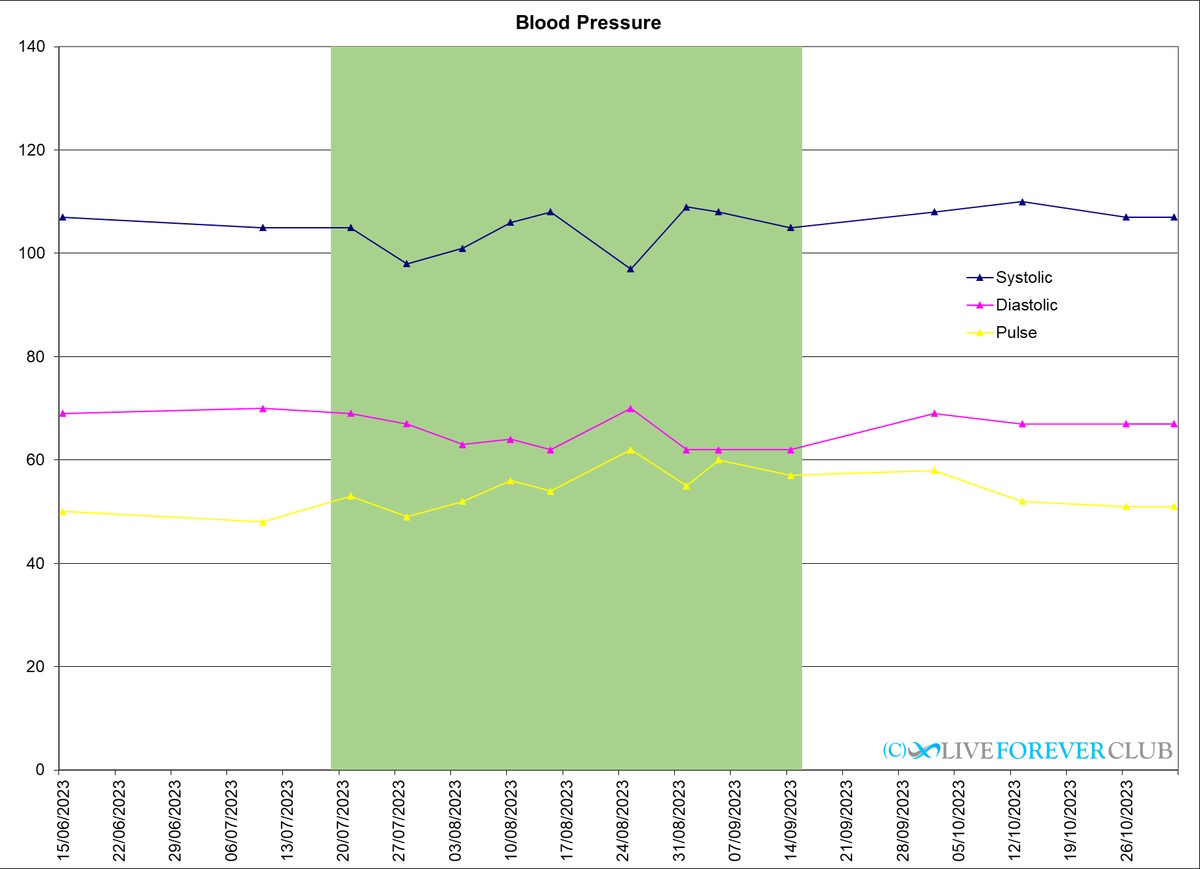
My lung function seems to have improved whilst taking Nuchido TIME+, normally averaging around 600, but increasing to around 620 during supplementation.
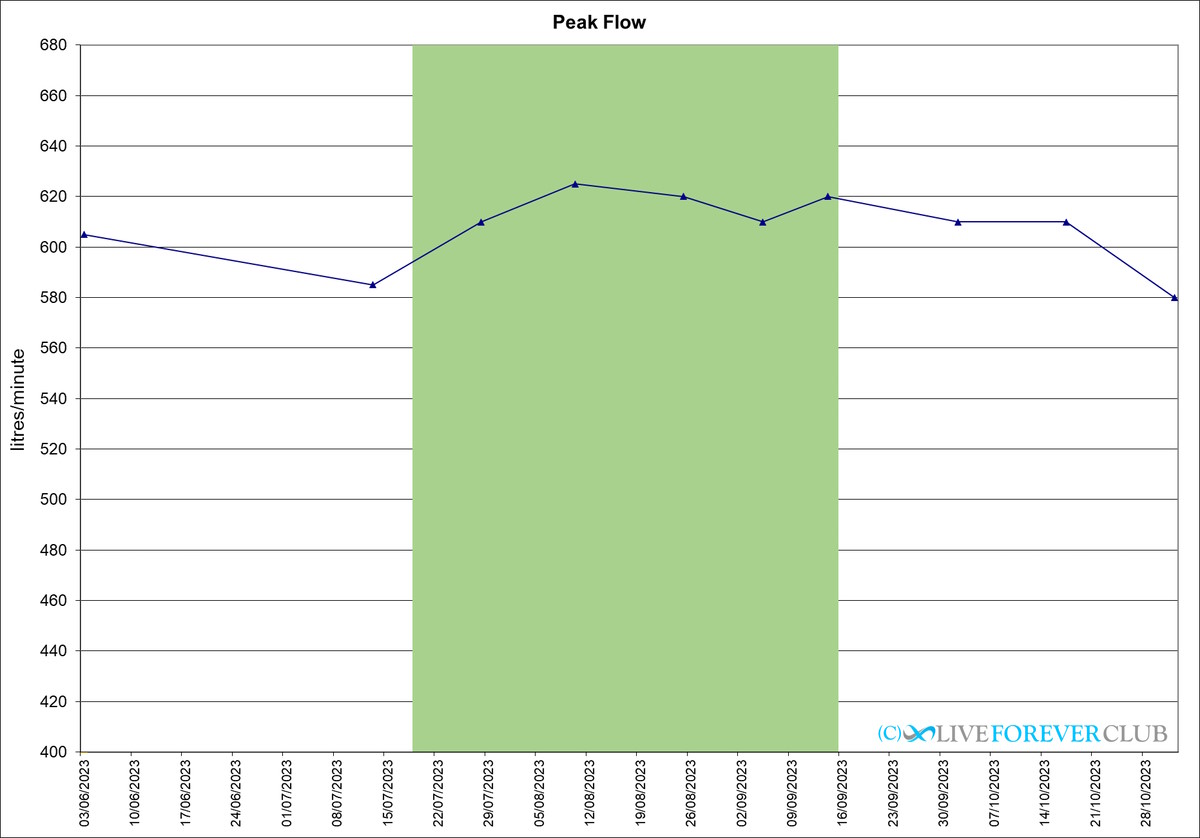
There’s probably not enough data points on my 8 mile runs – I’ve changed my routine a bit this year so not doing every week as previously.
However, the few 3 mile runs I did during the trial were possibly 5 seconds per minute faster than average (remember, up on the graph means getting slower) which doesn’t sound a lot but I have to push to improve my pace by that much usually.

There is a lot of variability in my SpO2 readings, so could have done with more data points, but there does appear to be a downward trend during the supplementation period which then recovers afterwards. This wouldn’t be a good sign, so something else to watch carefully if I tried a nicotinamide supplement again.
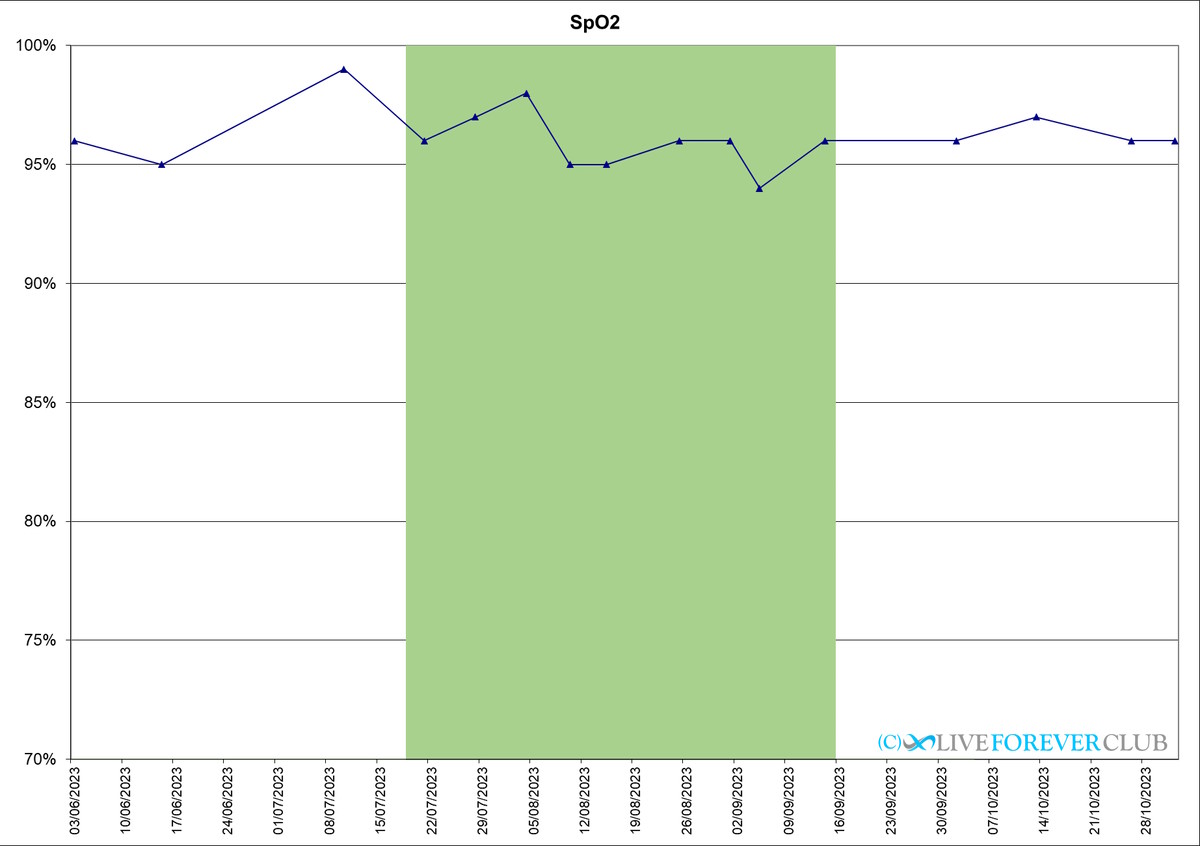
My fat percentage, as measured on bathroom scales, always fluctuates wildly, so I don’t think anything can be read into that. However, my weight possibly fell by 0.5 kg less for duration of the trial – pretty negligible, and only noticeable on the graph because the y-axis starts at 60 kg rather than zero.
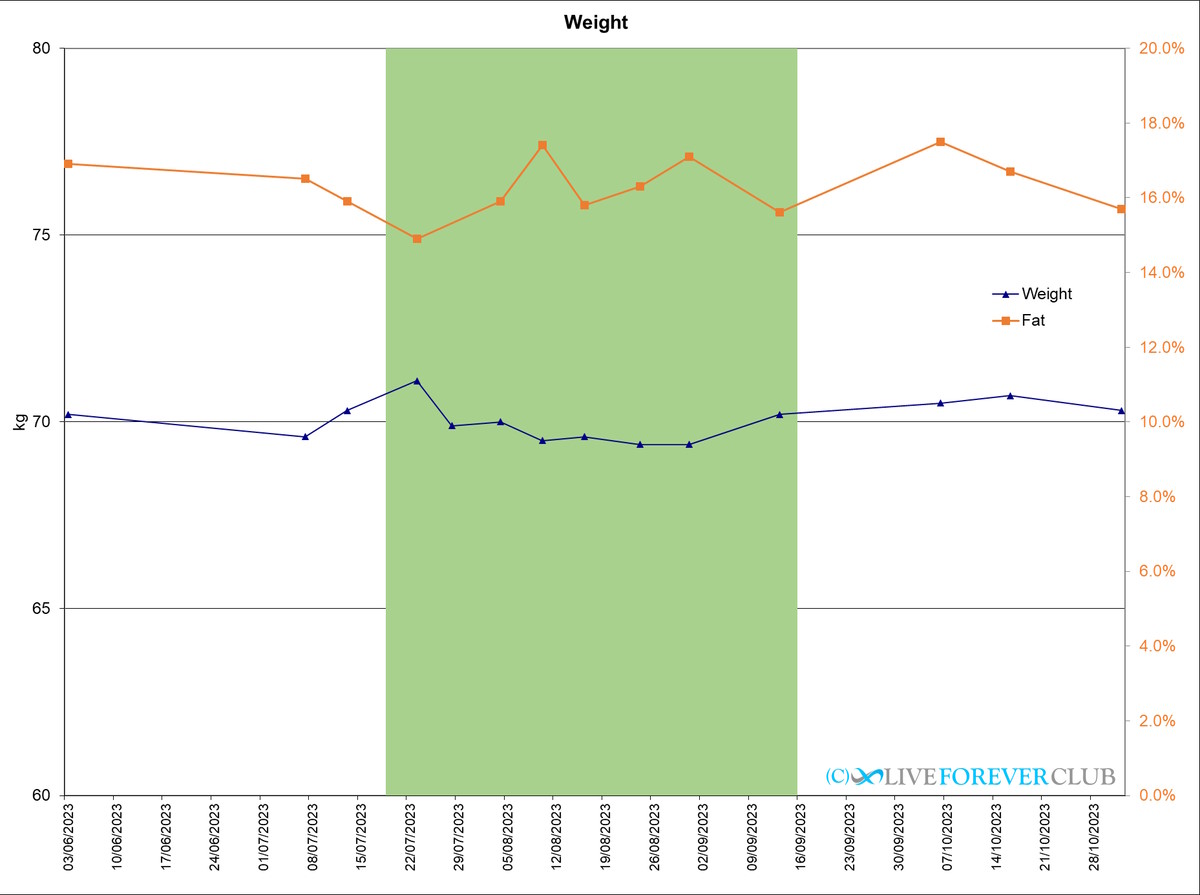
As always, a short-period trial with a limited number of data points makes it hard to draw any firm conclusions. However, Nuchido TIME+ did increase my NAD levels more than when I tried NR, but not as much as when I took NMN. Of course, everyone’s cellular biology works slightly differently so I would suggest trialling and monitoring (particularly with NAD testing) what works for you.
Nuchido TIME+ is a little cheaper (at £65 per month) than the other NAD boosters I have tried (coming in around £80-£100/month) so gives it an advantage if they work as well for you as other supplements. But that is a big IF as I have seen different impacts from different variations of nicotinamide, so price should only be a factor once you have determined what is most effective for you.
In summary, Nuchido TIME+ appears to be a safe way to try to slow down ageing by reversing the decline in your NAD levels. I saw my NAD level boosted, but that only had minor impact on my physical functionality (reduced blood pressure, improved peak flow) with a couple of side effects to monitor (pulse rate, SpO2). I’m probably going to include it in intermittent use of NAD boosters, as each type my have a slightly different effect, so until I can monitor my biomarkers more closely it seems a safer to spread my bets.
If you do want to try Nuchido TIME+ don’t forget that club members can get 15% off their first purchase using the discount code here:
https://liveforever.club/page/members-discounts
Click on resource name for more details.
Club discount available - click here
Nuchido TIME+ is a powerful NAD+ supplement using a proprietary formula
Oxford Immune Algorithmics developing AI-driven precision medicine for all – site visit report
Exponential growth in ageing research
What consumer tests are available to check your hallmarks of ageing and how they're impacting your body?
A good jump in NAD levels and grip strength during this one month trial, but not everything improved
What is the impact on physical biomarkers from taking spermidine supplements?
2 month trial of nicotinamide riboside NAD booster Tru Niagen
I try out Jinfiniti's intracellular NAD test and explain more about NAD+